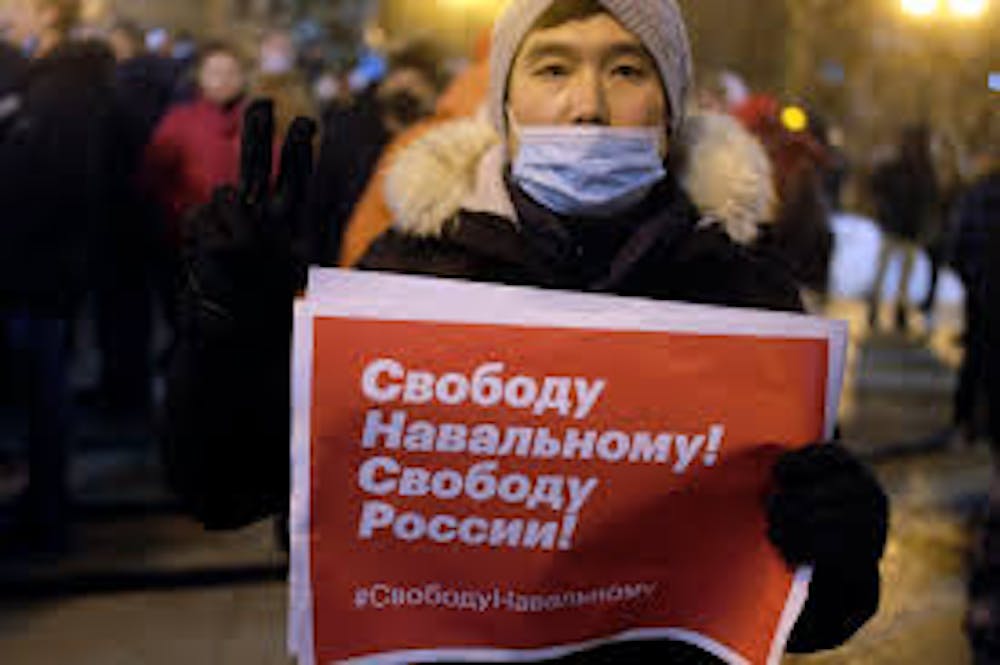Alexei Navalny, an anti-corruption politician who is the most prominent domestic critic of Russian President Vladimir Putin, was poisoned with a Novichok nerve agent in August. Navalny and countless Western officials consider the incident an assassination attempt carried out with Putin’s explicit approval.
After spending months in recovery in Germany, Navalny returned to Moscow on Jan. 17, where he was immediately detained upon arrival. Soon after, his team released a two-hour long exposé detailing Putin’s corruption since his time as a KGB agent.
The film focuses on the president’s construction of a USD $1.37 billion estate off the Black Sea coast, financed entirely by bribes and taxpayer money. Aptly titled “Putin’s Palace. History of the World’s Largest Bribe,” the video also delves into some of the absurdities of the palace: an extravagant “aquadisco,” $850 toilet wands and a mold infestation which prompted an entire redesign.
Massive protests erupted in more than 100 cities in response to both this new revelation and Navalny’s detainment and 2.5-year jail sentence. These were the biggest anti-government demonstrations in several years, and arrests by riot police reached thousands.
Since winning the presidency in 2000, Putin has transformed his seat of office into a golden throne. The democratic backsliding was overlooked at first; the people’s overall satisfaction with living conditions did not warrant a need for an opposition party. Even the 2016 assassination of prominent liberal politician Boris Nemtsov was treated as an isolated tragedy and not a consequence of the paranoid atmosphere created by Putin.
The situation is a little different in present-day. Ongoing economic downturn, lowered wages and decade-high unemployment may have also contributed to the size of these anti-government protests.
It is an obvious conclusion to make that this series of events wounded Putin’s pride in some way. After all, his opponent survived a deadly nerve-agent — a brand new formula at that. He released a detailed exposé on Putin’s fairytale palace, whose mantle was built on stolen government funds. He nonchalantly unmasked his own Federal Security Service assassins over a phone call just by pretending to be a fellow agent. He then organized one of the largest protests in recent years. All of this was done not long after a horrifying near-death experience.
The standoff between Navalny and Putin became a matter of avenging this extreme ridicule. Putin has established a reputation as an iron-fisted strongman ready to assert dominance domestically and abroad. Enforcing 2.5-year prison sentence on Navalny and unleashing riot police onto protesters is the least he can do — but a response any more aggressive than this would risk greater fallout with the Russian public.
As of Feb. 3, Navalny joins the long list of politically-motivated imprisonments under Putin. Back in 2005, Mikhail Khodorkovsky, once the richest man in Russia, made his support for the liberal opposition no secret and was sentenced to nine years in prison. His sentence was increased by five years in 2010 despite blatant violations in due-process. Freed early in 2013, Khodorkovsky had lost much of his political sway.
Considering this, one might say that history is repeating itself with Navalny. After all, Putin is more than capable of extending the relatively short sentence to let Navalny fade to obscurity. However, I think it is more reasonable to say that history rhymes more than it repeats. There are two main factors that set Navalny apart from Khodorkovsky: storytelling and social media.
If a politician narrates a story with enough panache that it pulls at the strings of peoples’ closeted hatred for the State, then that will be enough to mobilize them into action. Putin’s greatest mistake, in his decades-long political career, was of course indulging his own hedonism off the Black Sea coast while his people suffered. But his second-greatest mistake was gifting his most potent rival with such a dramatic, messianic narrative to broadcast all over the internet.
The whole ordeal — from the poisoning to the arrest — had just about as much subtlety as a telenovela. Navalny made a point to mock this predictable, cheesy plotline: watching Rick and Morty on his plane back to Moscow, laughing during his sentencing and drawing a heart on a glass cage for his wife, Yulia.
With platforms like YouTube, Instagram and Twitter, Navalny was able to broadcast his message to millions of Russian citizens — mostly the youth. This accessibility of information allowed him to organize such large-scale protests. Even behind bars, Navalny cannot be easily forgotten and, for the first time in a while, Putin no longer holds all the cards.
It’s easy to draw parallels to the 2004 Orange Revolution in Ukraine, their massive, two-month long protests in response to incumbent President Viktor Yanukovych’s electoral meddling. The Orange Revolution ultimately resulted in Yanukovych’s deposition and democratic election of reformist Viktor Yushchenko. Plus, both Ukraine and Russia are what many consider hybrid regimes — a midway point between autocracy and democracy.
This form of government is inherently unstable compared to wholly democratic or autocratic institutions, thereby making it possible to tilt one way or the other. However, it is dangerously idealistic to assume Putin’s days in office are numbered. Unlike Yanukovych, who was widely disliked, Putin’s approval rating among middle to old-aged voters — i.e., the vast majority of the population — remains stable.
Keeping this in mind, an imminent “color” revolution — or any fledgling of change — seems nearly impossible. Over the years, Putin has had little trouble implementing his artistic vision for his palace. Don’t like the furniture? Replace it. Think the wine cellar is too small? Expand it. Absolutely loathe the term-limits in the Constitution? Write a new one.
But the days of easy renovations are over for Putin: A new mold engulfs his palace walls, a stubborn one that can’t easily be ignored or cleaned. He and his cronies will find housekeeping — or, palacekeeping — a more demanding chore from here on out.
Shreya Sriramineni is a freshman majoring in Physics. She is from Allentown, Pa.





